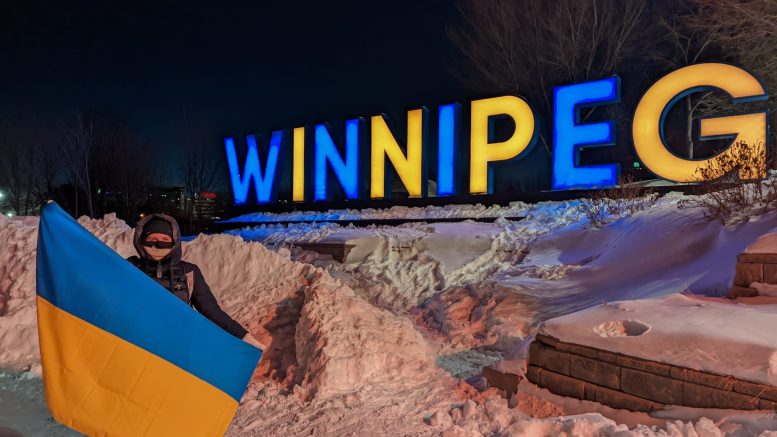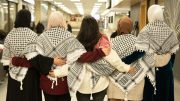On Feb. 24, Russia launched a full-scale invasion of Ukraine, reigniting a war that affected the region for eight years. Western observers immediately turned to experts on the region to understand what, to many, seems like a senseless massacre ill-fitting to 21st-century expectations of peace between states. This has meant a litany of media and academic speaking engagements for Yuliia Ivaniuk, co-ordinator of the centre for Ukrainian Canadian studies.
“I’ve certainly appreciated the opportunity to have my voice be heard and to speak for […] Ukraine and [the] Ukrainian-Canadian community,” Ivaniuk said.
“On the other hand, morally and mentally, it’s been quite difficult to comment on matters and things as they unfold — knowing that I still have most of my family in Ukraine — and it’s been a highly emotional and disturbing time for a lot of us. Just thinking about what’s happening there on the ground and feeling quite helpless, being so far away.”
The centre has co-ordinated two panel discussions in recent weeks discussing the intersections of peace, conflict, security and cultural identity. The first occurred on Feb. 17, one week before Russia’s invasion of Ukraine. The panel highlighted remaining avenues for peace and the speakers pushed against the assumption that conflict was as inevitable as western media had portrayed it. Fittingly, the panel was co-organized with the peace and conflict studies (PACS) program and moderated by Adam Muller, director of PACS.
“We were hoping to see if there was still any ground for peaceful resolution to this crisis, but it appeared that there wasn’t,” Ivaniuk said.
“Perhaps because we are not dealing with a regular, rational actor […] but rather, we are dealing with an authoritarian-minded individual who has still the KGB [and] FSB type of mindset.”
Ivaniuk is, of course, referring to Vladimir Putin, president of Russia, who has been the de facto head of state of Russia since his inauguration in 2000.
The second panel discussion was co-ordinated with the centre for defence and security studies and occurred on March 4, just over a week after the invasion had begun. The tone of the event had markedly shifted. Several speakers have personal ties to Ukraine and shared personal photographs, personal messages and accounts of the early moments of the invasion. The panel focused on debunking myths and managing expectations.
Ivaniuk dispelled some widely circulating myths regarding the invasion. Among these, Ivaniuk asserted that contrary to Russian media sources, Russian forces are not engaged in a peacekeeping mission, and civilians and civilian infrastructure has been targeted. Ivaniuk’s academic history has made her an expert in the Russia-Ukraine war.
Ivaniuk first came to the University of Manitoba from Ukraine in 2016 to complete a master of arts degree in PACS. Her research interests include the Russia-Ukraine war and the role of identity in conflict. Ivaniuk is particularly interested the use of identity and cultural identity to justify or create conflict. Ivaniuk recently worked with Maureen Flaherty in conducting 33 interviews of Ukrainian-Canadian newcomers to Canada.
“It has been truly fascinating to learn and write about the immigrant experiences and how they transcend with other immigrant groups,” Ivaniuk said.
“They’re actually quite similar [with] different push and pull factors, cultural peculiarities and even just the duplicity and multiplicity of identities that people develop as they migrate to new environments.”
Ivaniuk emphasizes the importance of preserving Ukrainian culture during a moment of deliberate Ukrainian erasure by Putin.
“[Putin] has this belief that Russia has a great destiny to fulfill, to collect the lands of the Russian Empire to bring it back and […] Ukraine does not have any legitimacy to exist,” Ivaniuk said.
“Our language is not legitimate. Our sovereignty is not legitimate. Our interpretation of history should not exist, even our independent church. All of these are contentious issues for Russia’s leadership.”
By participating in the centre’s cultural activities, students and community members can resist the systemic erasure and attempts to annihilate Ukrainian culture by Putin’s regime. The centre offers a reading club, regular lectures and panel discussions and a new letter of participation program. Residents of Canada may attend a minimum of seven lectures — or a minimum of five lectures and two reading club meetings — to earn a letter of participation in Ukrainian-Canadian heritage studies.
“I’m extremely grateful for the fact that it has been covered by the university and the further support that the centre and the Ukrainian-Canadian community and faculty, staff and students have received in this difficult crisis,” Ivaniuk said.
“I hope that Ukraine will prevail and come out of this as, I don’t want to say a winner because there are no winners in the war, but as someone who is able to defend their sovereignty and continue evolving to being a true liberal democracy.”




